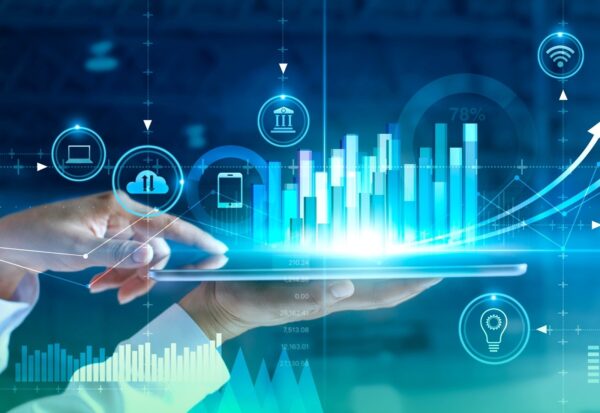Navigating the Digital Economy: Redefining Global Market Dynamics
The digital economy has swiftly transitioned from a niche concept to a transformative force that is reshaping global markets. As digital technologies become integral to businesses, governments, and everyday life, we are witnessing a fundamental shift in how commerce, finance, and communication operate. This blog delves into the core aspects of the digital economy, its disruption of traditional economic frameworks, and its influence on the future of global markets.
The Digital Economy Unveiled
The digital economy encompasses the vast array of economic activities powered by online connections between individuals, businesses, devices, and data. Driven by the internet, mobile technology, and digital platforms, this new economic paradigm is characterized by the seamless merging of digital and physical realities.
Essential Pillars of the Digital Economy:
- Online Commerce and Digital Marketplaces: The retail landscape has been revolutionized by digital platforms like Amazon, Alibaba, and Shopify. These platforms have redefined shopping by offering consumers instant access to a vast array of products and services. The convenience and customization provided by online marketplaces have established them as the bedrock of the digital economy.
- Financial Technology and Digital Payments: Fintech has reimagined how we handle money, invest, and conduct transactions. From mobile banking to blockchain and cryptocurrencies, fintech innovations are democratizing access to financial services and enabling faster, more secure transactions. The rise of digital finance is significantly expanding financial inclusion, particularly in previously underserved regions.
- Data-Driven Insights and Artificial Intelligence: In the digital economy, data is a critical resource. The massive volume of data generated by digital interactions powers artificial intelligence (AI) and machine learning, enhancing decision-making, streamlining supply chains, and driving business innovation.
- Remote Work and the Gig Economy: The pandemic’s acceleration of remote work has transformed labor markets and created new opportunities for freelancers and gig workers. Digital platforms like Upwork, Fiverr, and TaskRabbit have made it easier for individuals to offer their services on a global scale, challenging traditional employment models.
- Digital Infrastructure and Connectivity: The digital economy relies on a strong foundation of digital infrastructure, including high-speed internet, cloud computing, and cybersecurity. As the Internet of Things (IoT) connects more devices, the demand for reliable and secure digital infrastructure will continue to rise.
Disrupting Traditional Economic Structures
The digital economy is more than just an extension of the traditional economy; it represents a paradigm shift that challenges established economic models. Businesses that resist digital transformation risk falling behind, while those that embrace digital innovation are thriving.
Key Disruptions:
- Industry Upheaval: Industries such as retail, banking, media, and transportation have undergone significant disruption due to digital advancements. Companies that have successfully adapted, like Netflix in media and Uber in transportation, have outpaced their traditional counterparts.
- Global Market Access: The digital economy has lowered entry barriers, allowing businesses to reach international markets with minimal investment. Small and medium-sized enterprises (SMEs) can now compete globally, driving economic growth and fostering innovation.
- Evolving Consumer Expectations: Digital technologies have empowered consumers with more choices and information. This shift has compelled businesses to prioritize customer experience, personalization, and transparency to stay competitive.

Shaping the Future of Global Markets
As the digital economy continues to evolve, its impact on global markets will deepen. Here are some emerging trends to watch:
- Digital and Central Bank Digital Currencies (CBDCs):
Governments and central banks are exploring digital currencies to modernize payment systems and reduce reliance on physical cash. CBDCs have the potential to reshape monetary policy, enhance financial inclusion, and introduce new tools for economic management. - Sustainable Digital Practices:
With a growing focus on environmental sustainability, there is a push for digital technologies to minimize carbon footprints and promote eco-friendly practices. The digital economy can play a crucial role in achieving global sustainability objectives. - Cybersecurity and Trust in the Digital Era:
As digital transactions proliferate, ensuring robust cybersecurity and maintaining digital trust are critical. Businesses and governments must invest in advanced cybersecurity measures to safeguard data and preserve consumer confidence. - Inclusive Digital Transformation:
To fully realize the potential of the digital economy, it is essential to bridge the digital divide and ensure that everyone has access to digital tools and opportunities. An inclusive digital transformation can drive economic growth while reducing inequality.
Conclusion:
The digital economy is not just reshaping global markets; it is redefining the very fabric of economic activity. As digital technologies continue to advance, they will challenge traditional industries, create new opportunities, and reshape the way we think about commerce, finance, and connectivity. Embracing the digital economy is essential for anyone looking to thrive in this interconnected world. By understanding its key components, recognizing its disruptions, and anticipating future trends, we can better navigate the complexities and opportunities of this dynamic economic landscape.
FAQs:
1. What exactly is the digital economy?
The digital economy refers to the vast range of economic activities that are driven by digital technologies, including online platforms, mobile apps, cloud computing, and internet-based services. It involves the production, exchange, and consumption of goods and services through digital channels.
2. How does the digital economy contrast with the traditional economy?
The digital economy operates primarily in the online space, focusing on the exchange of digital goods, services, and data, while the traditional economy is rooted in physical transactions and tangible goods. The digital economy is characterized by speed, global reach, and the ability to scale rapidly.
3. What are the core elements of the digital economy?
The digital economy is built on pillars such as e-commerce, financial technology (fintech), big data, artificial intelligence (AI), digital connectivity, and the gig economy. These elements interconnect to create a dynamic and rapidly evolving economic environment.
4. How has the digital economy disrupted traditional sectors?
Traditional sectors like retail, finance, and media have been significantly disrupted by the digital economy, as new technologies and digital platforms introduce more efficient processes, lower costs, and greater customer convenience, challenging established business models.
5. What role does data play in the digital economy?
Data is a fundamental resource in the digital economy, often likened to the “new gold.” It powers AI, drives personalized marketing, informs business strategies, and enables real-time decision-making, making it essential for companies to remain competitive.
6. How does the digital economy influence global commerce?
The digital economy has revolutionized global commerce by removing geographical barriers, allowing businesses of all sizes to reach international markets with minimal overhead. This has fostered increased competition and innovation on a global scale.
7. What are some challenges associated with the digital economy?
Challenges include cybersecurity risks, privacy issues, the widening digital divide, and the need for adaptive regulatory frameworks. These challenges must be addressed to ensure the digital economy’s growth is sustainable and equitable.
8. What does the future hold for the digital economy?
The future of the digital economy will be shaped by emerging technologies like blockchain, AI, digital currencies, and the Internet of Things (IoT). These advancements are expected to further disrupt industries, create new business models, and enhance global connectivity.
9. How can businesses thrive in the digital economy?
Businesses can thrive by embracing digital transformation, investing in new technologies, focusing on customer-centric strategies, and staying agile in response to changing market trends. Continuous innovation and adaptability are key to success in the digital economy.
10. What is the government’s role in the digital economy?
Governments play a crucial role by setting policies that support innovation, investing in digital infrastructure, and ensuring regulations protect consumers while promoting fair competition. They also have a responsibility to bridge the digital divide and foster inclusive growth.
11. How does the digital economy affect employment?
The digital economy is reshaping the job market, creating new opportunities in tech-driven fields while also challenging traditional employment structures. The rise of remote work and the gig economy are significant trends that are transforming how people work.
12. Can the digital economy promote sustainability?
Yes, the digital economy has the potential to promote sustainability by optimizing resource use, reducing waste, and enabling more eco-friendly practices. For example, digital solutions can enhance supply chain efficiency, and remote work can decrease environmental impact.




